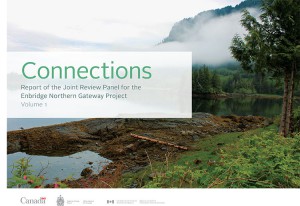The federal government’s main consultation with First Nations on the Northern Gateway Joint Review Panel report is limited to just three simple questions that had to be answered within 45 days, according to documents seen by Northwest Coast Energy News.

That despite the fact that the first volume of the JRP report “Connections” is 76 pages and the second volume “Considerations” is 418 pages including the 209 recommendations and appendices and came after two years of hearings and tens of thousands of pages of evidence.
On Dec. 6 and again on Dec. 16, 2013, just prior to the release of the Joint Review Panel report, Brett Maracle, Crown Consultation Coordinator at the Canadian Environmental Assessment Agency for the Northern Gateway project wrote to the First Nations potentially affected by Northern Gateway, saying their response had to be filed within 45 days of the release of the JRP. Since the report was released on December 19, 2013, that made the initial deadline January 31, 2014.
The letter also told the First Nations that if they wanted their positions included in the “Crown Consultation Report” that would be part of the package on Northern Gateway presented to the federal cabinet, that position had to be limited to just two to three pages “given the number of groups involved” with a final deadline of April 16, 2014.
Maracle’s letters used the term Phase IV to define the post JRP consultations, implying there were three earlier stages of consultation, something many First Nations have disputed, especially since the Harper government had earlier maintained that the JRP itself was the constitutionally mandated consultation.
The cabinet has until June 19, 2014, 180 days after the release of the report to approve the issuing of the federal permits for the Northern Gateway project. Consultation with First Nations on projects such as the Northern Gateway is required by the Constitution and has been upheld by the Supreme Court of Canada.
The three questions outlined in the letter were:
- Does the Report appropriately character the concerns you raised during the JRP process?
- Do the recommendations and conditions in the Panel Report address some/all of your concerns?
- Are there any “outstanding” concerns that are not addressed in the Panel Report? If so, do you have recommendations (i.e proposed accommodation measures) how to address them?
Consultation on implementation
The third question appears to confirm what most political observers have said, approval of the Northern Gateway by the Harper cabinet is a a forgone conclusion, since Maracle speaks of “accommodation measures.” When the JRP approved the Northern Gateway project, the panel said that Enbridge’s proposed “mitigation” measures in case of a spill were adequate, something environmental groups and First Nations are now disputing in court.
It appears from the correspondence seen by Northwest Coast Energy News, that the federal government will only consider further specific consultations with First Nations after the approval of the Northern Gateway and only then on the implementation and construction process, rather than consulting on the project as a whole.
The Haisla have filed a document in response to the JRP that notes that
The Haisla Nation needs to understand Canada’s views of the role that future federal decisions might play for the proposed project. In its December 12, 2013 to Mr. Maracle, the Haisla Nation asked the federal government to provide a comprehensive list of the regulatory permits which would be issued the the federal government decision-makers in Haisla Nation Territory in the event the proposed project is approved and describe the consultation process that would occur prior to decisions being on those regulatory permits, within 45 days of the issuance of the JRP Report.
Mr. Maracle’s January 29, 2014 [reply] suggests that the only future federal decisions on the proposed project which may entail consultation are specific watercourse crossing and fish habitat destruction permits issued by Fisheries and Oceans Canada.
Whole-of-government
One of the problems reaching back to long before the Joint Review Panel hearings began is that the Harper government policy was what they called a “whole-of-government” approach in its consultations with First Nations, saying: “The Crown is open to discussing how consultation with the framework provided will be carried out.”
In their repose, the Haisla say the federal government never defined how the “whole-of-government” approach to First Nations was going to work and noted:
What Canada should have realized is that it has a very real obligation to consult with the Haisla Nation at the deepest end of the consultation spectrum that cannot be pigeon-holed into a one size fits all approach.
Further, the term whole-of-government is misleading, as this approach actually prohibits the majority of government from engaging in consultation.
The Haisla then say: “Documents we have obtained under an Access to Information Request clearly indicate individual departments were asked not to communicate directly with the Haisla Nation.”
The response goes on to say:
Further questions at federal government witnesses during the JRP process confirmed that federal departments had not met with the Haisla Nation since the commencement of the JRP process. While these witnesses were reluctant to confirm that they had been prohibited from meeting with us, they repeatedly referred to the “whole-of-government” approach to consultation as their reason for not meeting.
Canada’s “whole-of-government” approach clearly limited engagement to a strict process with no opportunity for real engagement.
Earliest stages
The Haisla are telling the Harper government:
It is clear that the Haisla Nation that we are the very earliest stages of consultation with Canada about the proposed project….It is clear to the Haisla Nation that the 45-day period within which Canada has unilaterally determined face-to-face meetings with all the Aboriginal groups potentially affected by the proposed project will occur is not an adequate amount of time to complete a meaningful consultation process.
Related
Haisla consultation reply outlines flaws in Northern Gateway Joint Review report
Haisla response lists evidence rejected by Northern Gateway Joint Review